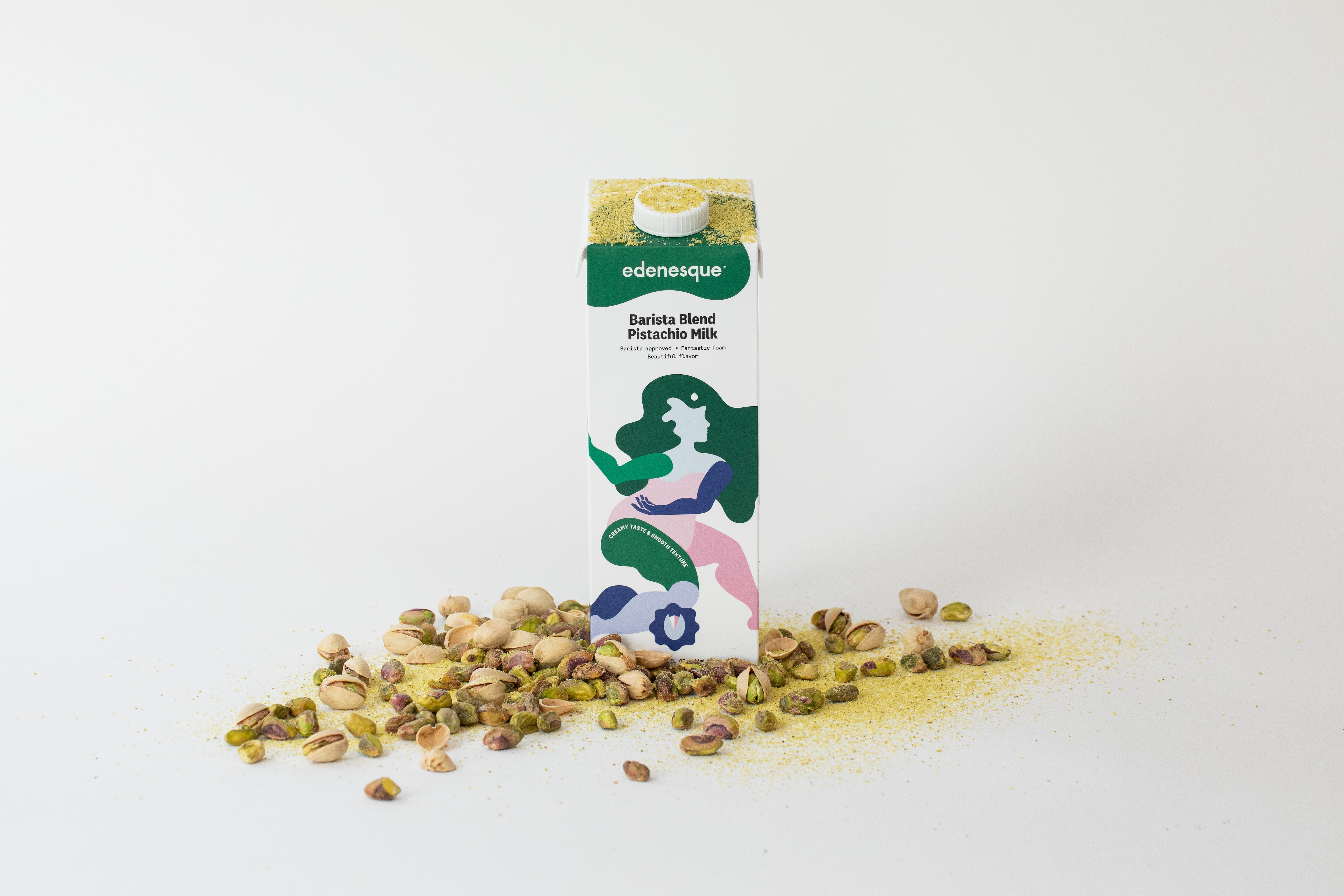Plant-based milks are expanding beyond conventional options like almond, soy and oat to novel ingredients, like pistachio and corn, with a sustainability-focused approach to sourcing and philanthropy — potentially giving the category a much-needed sales boost.
Both refrigerated and shelf-stable plant-based milk sales were down by 4.7% year-over-year ending Dec. 29, according to SPINS and MULO data. Refrigerated plant-based milk sales declined 4.9% from $2.63 billion in 2023 to $2.5 billion a year later, while shelf stable sales declined from $317 million in 2023 to $309 million in 2024 – a 2.4% drop. However, sales for shelf-stable plant-based milks like plant-based milk blends, coconut milk and soy increased by 10.3%, 27.5% and .7%, respectively, per SPINS and MULO data.
For plant-based milk brand Edenesque developing its pistachio milk reflected consumer preferences for diverse and premium options, explained Leslie Woodward, CEO, Edenesque. While the company offers oat milk, Edenesque’s Barista Blend Pistachio Milk, which is slightly sweetened with coconut nectar and free from cane sugar, meets consumer demand for premium ingredients, Woodward said.
“As demand for alternatives to traditional dairy grows, we saw an opportunity to introduce a distinctive, high-quality pistachio milk that meets the needs of both coffee enthusiasts and health-conscious consumers,” Woodward said.
Woodward also sees pistachio milk as an opportunity to introduce more culinary-forward, functional and premium plant-based milks “that go beyond basics.”
The company offers Unsweetened Oat Milk, Barista Blend Oat Milk and Barista Blend Pistachio Milk retailing at $6.99 each. All SKUs are available at Whole Foods locations in New York and Connecticut, select local retailers, all 27 Joe Coffee locations and on edenesque.com. The company also plans to introduce an almond-based option in the future.
Maïzly’s corn-based milk mimics mouthfeel of dairy milk
Corn-based milk brand Maïzly launched in the US last month after success in Costa Rica, Latin America and Africa as a “milk alternative that actually feels like dairy milk,” according to the company. Maïzly is made with non-GMO corn, chickpea protein and coconut oil and contains less than a quarter of the sugar of dairy milk and is free from seed, nut or vegetable oils, per the company. The company offers two flavors: Chocolate and Original.
While the beverage’s taste and nutrition (each serving contains vitamins D2, A, E and calcium) were key to delivering consumers’ preferences for better-for-you options, Maïzly’s sustainability initiatives are just as significant, according to the company’s Co-founder and COO, Marcel Van Der Merwe.
Maïzly capitalizes on corn’s global abundance to source locally
The company recently won the National Corn Growers Association’s Consider Corn Challenge IV for the beverage’s formula that “replicates the mouthfeel of dairy milk,” and for the company’s production process that minimizes water and ingredient waste, according to NCGA.
Maïzly uses a soluble corn fiber and corn maltodextrin that provides a similar sensory experience as dairy milk. The company leverages corn’s abundance around the world and sources its ingredients close to its partners “significantly reducing food miles and minimizing our environmental footprint,” according to the company.
During the co-founders’ travels through Southern Africa, the lack of care and resources for mothers inspired the development of Maïzly’s infant formula. Although not a corn base, Maïzly’s CODEX Compliant infant formulas, including F100 and F75 formulas, are made with a soy base and address acute malnutrition in infants.
They are available in single-serve sachets. The packaging format allows for mothers to purchase what they need for a single day, per the company.
Edenesque’s Food Insecurity Initiative addresses food scarcity in New York
Within the plant-based space, consumers are looking for brands that represent “something meaningful” that reflects authenticity and a nuanced understanding of the consumer, Woodward advised.
Edenesque’s Food Insecurity Initiative is the brand’s commitment to addressing hunger in Columbia County, NY, through partnerships with community organizations and Black farmers, she explained.
“The initiative is working to build a more resilient, equitable food system that benefits individuals, families, farmers and the broader community,” Woodward said.
The program’s key commitments include a direct monetary contribution of $40,000 to partners until net revenues exceeds 1% and an increased benchmark when surpassing those revenues, product donations to grocery partners, leveraging marketing efforts to encourage public donations for partner organizations and hiring a dedicated program director to oversee logistics and develop a scalable, replicable business, Woodward explained.

